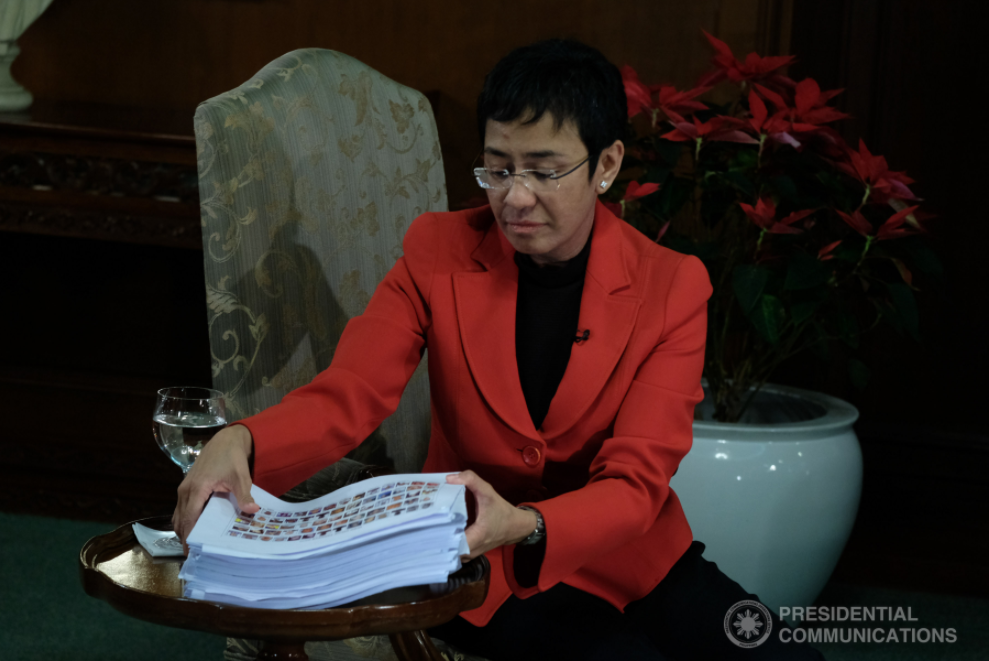Breaking
Gov’t orders Rappler to shut down; Rappler cries ‘harrassment’

The Securities and Exchange Commission (SEC) revoked the registration of news organization Rappler for violating constitutional restrictions that prohibit foreign ownership of mass media. (Seen in this PCOO photo is Rappler CEO Maria Ressa)
MANILA, Philippines—The Securities and Exchange Commission (SEC) revoked the registration of news organization Rappler for violating constitutional restrictions that prohibit foreign ownership of mass media.
Calling Rappler a “mass media entity that sold control to foreigners,” the SEC, in a ruling dated January 11, 2018 but released on its website on January 15, Monday, said that Rappler violated the Foreign Equity Restriction in Article XVI, Section 11(1) of the Constitution which states, “The ownership and management of mass media shall be limited to citizens of the Philippines, or to corporations, cooperatives or associations, wholly-owned and managed by such citizens.”
This ruling stemmed from accusations that Rappler is controlled and operated by its foreign investor, Omidyar Network (ON), a self-described “philanthropic investment firm” founded by EBay’s Pierre Omidyar and wife, Pamela Kerr.
Rappler, however, claimed in an article published on its website in February 2017 that it “remains 100% Filipino-owned” as the investments coming from ON are released through Philippine Depositary Receipts (PDRs) which “do not indicate ownership.”
The ON PDRs were voided by SEC for violating the laws on mass media and the Securities Regulation Code for fraudulent transaction.
In its ruling, SEC said that Rappler “created an elaborate scheme upon which its receipt of over a million dollars from a foreign investor would be theoretically defensible.”
Although ON has “more than 0% control” of Rappler, the latter gave the former “certain rights derived from equity and reserved to Filipinos” by giving it its “money’s worth in the form of negative control and cash distributions, all through a private contractual agreement” when it formed Rappler Holding Corporation, which was involved in receiving cash dividends from Rappler, Inc. and passing it to ON as “cash distribution.”
“Since this deceptive scheme involves the sale of a security, it falls within Section 26 (the Anti-Fraud provision) of the Securities Regulation Code,” SEC said.
‘Pure and simple harassment’
In response to SEC’s administrative penalties imposed against Rappler, the news organization, in a statement, expressed dismay over the government agency it said it trusted.
“Because we have acted in good faith and adhered to the best standards in a fast-evolving business environment, we were confident that the country’s key business regulator would put public interest above other interests that were at play in this case,” Rappler said.
“We were wrong,” it added.
“The SEC’s kill order revoking Rappler’s license to operate is the first of its kind in history – both for the Commission and for Philippine media.”
“What this means for you, and for us, is that the Commission is ordering us to close shop, to cease telling you stories, to stop speaking truth to power, and to let go of everything that we have built – and created – with you since 2012.”
Rappler also insisted that it has been “above-board” in its practices and “consistently transparent.”
“Every year since we incorporated in 2012, we have dutifully complied with all SEC regulations and submitted all requirements even at the risk of exposing our corporate data to irresponsible hands with an agenda. Transparency, we believe, is the best proof of good faith and good conduct.”
The news organization also noted the time when the SEC’s ruling was released and how it relates to the government’s alleged “harassment” against Rappler.
“In a record investigation time of 5 months and after President (Rodrigo) Duterte himself blasted Rappler in his second SONA in July 2017, the SEC released this ruling against us. This is pure and simple harassment, the seeming coup de grace to the relentless and malicious attacks against us since 2016.”
Rappler also vowed to exhausted all legal remedies and fight for journalism.
“We will continue bringing you the news, holding the powerful to account for their actions and rulings, calling attention to government lapses that further disempower the disadvantaged.”
“We will hold the line.”





















